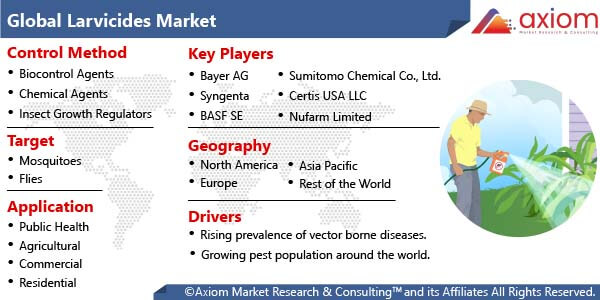A larvicide is an insecticide that is aimed precisely alongside the larval life stage of pests. Their most frequent use is against mosquitoes. Larvicides may be contact poisons, stomach poisons, growth regulators, or (progressively more) biological control agents.
In accordance with the WHO, approximately 40% of the population largely those living in the poorest countries in the world face the risk of experiencing from some of the terrible diseases like malaria. Every year more than 500 million people fall victim to malaria and dengue diseases. Environmental, socio-economic, and climatic issues (temperature, humidity and rainfall) affect disease infection and impact transmission patterns of these diseases. Government and several concerned organization have been taking precautionary measures to control malaria diseases. Larvicides is one critical solution to these kind of problems. Larvicides precludes larvae from developing into adult mosquitoes. Larvicides can either be contact poisons, stomach poisons, growth regulators or biological control agents.
Market Dynamics- Global Larvicides Market
Issues such as an increase in the prevalence of vector borne diseases, epidemics or outbreaks, climatic changes, rise in the pest population, and ecological sustainability are some of the factors for the growth of the larvicides market. The increase in the implementation of biological and physical control methods and technological developments in mosquito control products will boost the demand for the larvicides market.
Larvicides Market Segmental Overview
The study analyses global larvicides market based on control method, target, application and geography.
Larvicides Market by Control Method
Various control methods such as biological agents, chemical agents, insect growth regulators etc. are used to specifically target against the larval life stage of an insect.
Bacillus thuringiensis, a biological control agent, is a bacterial disease specific to Lepidopteran caterpillars. Moreover, rapid increase in the usage of Bacillus thuringiensis israelensis, also known as Bti, and Bacillus sphaericus was observed that affect larval mosquitoes and midges.
Similarly, chemical agents such as Organophosphate insecticides, have been used extensively in agriculture and in household applications as pesticides. Across 25,000 varieties of pesticides are available in the United States, and their use is monitored by the Environmental Protection Agency (EPA).
Larvicides Market by Target
Larvicides are largely targeted on mosquitoes, flies and others. Larvicide products are used to help control mosquitoes outside the home. They work by killing larvae that hatch from mosquito eggs before they can grow into biting adults. When used according to product label instructions, larvicides do not harm people, pets, or the environment.
Larvicides Market by Application
Larvicides find application in public health, agricultural, commercial, residential and livestock. Larvicides may be unfeasible to apply in hard-to-reach natural sites such as leaf axils and tree holes, which are common habitats of Ae. albopictus, or in deep wells. The problem of accessing indoor larval habitats of Ae. aegypti (e.g. water-storage containers, plant vases, saucers) to be applied to the larvicides is a major restriction in many urban contexts.
Larvicides in water-storage containers should have low toxicity to other species and should not substantially change the taste, odour or colour of the water. WHO’s Guidelines for drinking-water quality provide reliable guidance on the use of pesticides in drinking-water. Justifiably, placing chemicals in domestic water, particularly drinking-water, is often regarded with suspicion and may be unacceptable in some communities.
Larvicides Market by Geography
Geographically, the study is comprised of the key countries of North America, Europe, Asia-Pacific and Rest of the World. North America is likely to dominated the global market for larvicides over the forecast period. Owing to the presence of many multinational and national companies in North America, this region is anticipated to be largest market for pest control products. Regions such as Europe, Asia Pacific and Rest of the World are also observing a rise in the demand for larvicides due to an increase in incidences of diseases, the prevalence of strict hygiene & food safety legislation, IPM practices, and the growing middle-class population.
Global Larvicides Market-Key Players
Bayer AG, Syngenta, BASF SE , Sumitomo Chemical Co., Ltd., ADAMA Agricultural Solutions Ltd., Certis USA LLC, Central Garden & Pet Company, Nufarm Limited, Russell Ipm Ltd, Eli Lilly and Company, Summit Chemical and Gowan Company among others are the major players active in the larvicides market.
Larvicides Market Highlight
- Sumitomo Chemical, in 2015, unveiled a novel, lon-lasting larvicide formulation that has been effective in stopping dengue fever, named SumiLarv
- In 2017, Russell IPM introduced Optiroll Super plus, in the USA market during the Biocontrol East exhibition
- Bayer AG’s Alsystin 480 SC Larvicide is one such product registered for the control of sciarid flies in mushrooms











